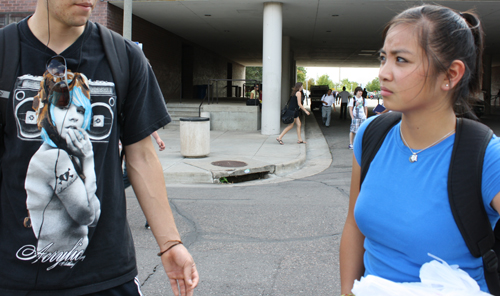
By: Allison Riley, SSH Correspondent
Recently, I started working as a Community Organizer/Canvasser for the Rape Assistance and Awareness Program (RAAP) here in Denver. My job is not only to fundraise for RAAP, but also to educate the public on sexual violence, keeping in mind that everyone in the Denver community is a potential juror on rape cases that enter the courtroom. Indeed, when myths about such violence are perpetuated, it disempowers us as a community.
My seventh day of training as a Canvasser covered the topic of sexual harassment. The first part of the training covered what I already knew—i.e. that most victims never report incidents of sexual harassment because they fear retaliation or they assume that reporting won’t do any good. However, the second part of the training, “Effects of Sexual Harassment,” really resonated with me.
According to the RAAP training manual, emotional reactions to harassment may include “fear, hostility toward the harasser, anger, confusion, frustration, hopelessness, powerlessness, depression, humiliation, a feeling of dirtiness, fear of crowds, fear of being alone, denial and sadness.” The manual also cites AAUW’s Hostile Hallways study, which describes effects as feeling self-conscious, less sure or less confident, afraid, doubting the possibility of ever having a romantic relationship, and confusion or self-doubt. According to AAUW, such feelings play themselves out through behavior; thus negatively impacting a student’s education. For example, those who are frequently harassed talk less in class and have a hard time studying.
RAAP’s training manual also says that physically, a harassed person may experience nightmares, loss of sleep or loss/increase in appetite, not wanting to be touched or feeling the need to be touched, and stress-related disorders such as stomach/muscle/headaches, rashes and ulcers.
I loved how this training dedicated time to the effects of sexual harassment on victims, mainly because I can check off all that I have experienced. However, due to the tendency to dismiss sexual harassment as a minor annoyance, sadly I am questioning the degree to which society would consider these effects serious or valid. Here we reveal the significance of sharing harassment stories—sure they provide proof, but more importantly, they emphasize the degree to which harassment is harmful. I would hope that any decent human being would agree that symptoms of anxiety, stress, and sickness are certainly not the proper result of “harmless flirting”. If it was truly harmless, none of us would have to be sharing our frustration.
Overall, I have a greater understanding of the fear-producing aspect of harassment and how it can escalate beyond unease. Further, that the words and gestures of a harasser can also escalate into sexual assault and other physical violence. This is not to say that it happens to every single victim, nor is it assuming that each victim reacts the same way to harassment. Regardless, I encourage all of us to continue abolishing harassment and rape culture altogether through raising consciousness of not only the experience, but also the consequences of being harassed.
Do you have a harassment story to share? Did you experience any of the symptoms mentioned in this blog? Submit your experience here!
Allison is a 2012 graduate of Metropolitan State University of Denver where she majored in Journalism with a minor in women’s studies. Follow Allison on Twitter at @a_wonderlandd.
